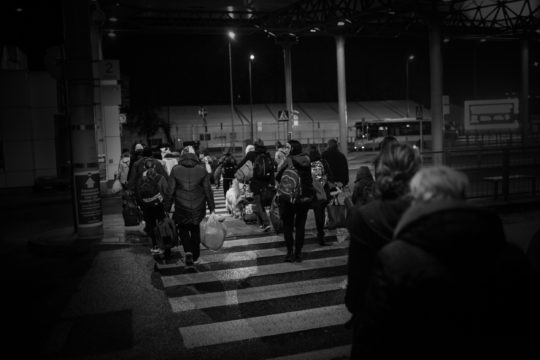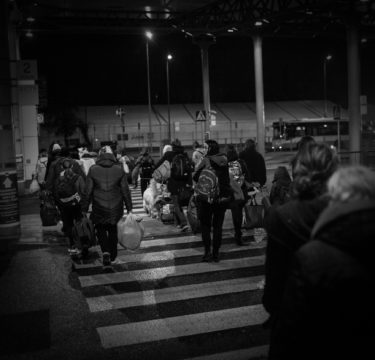6 percent of the homeless in Poland are Ukrainians. PCPM will help


The Polish Center for International Aid, as part of the Project to Prevent Homelessness for Ukrainian Refugees, funded by the Citi Global Innovation Challenge 2024, will help Ukrainian homeless people. PCPM will make it easier for those in need to find help, and equip those assisting with knowledge and information materials aimed at Ukrainian speakers.
– We are incredibly proud to be one of 50 organizations in the world to become winners of the Citi Global Innovation Challenge,” says PhD Wojciech Wilk, president of the Polish Center for International Aid.
Homelessness in Poland
Housing security is a situation in which formal or informal arrangements allow a person to live in “a sense of security, peace and dignity.” Meanwhile, insecurity is an intrinsic companion of those who have fled Ukraine. Fear turns into frowning, and frowning turns into learned helplessness, i.e. the belief that one has no control over one’s fate. This condition makes it much more difficult to become independent and can drag the affected person into a spiral of problems.
The UN estimates that 1.6 billion people around the world lack adequate housing and basic services. In Poland, too, we encounter people in crisis of homelessness. According to research by the Ministry of Family, Labor and Social Policy, there are more than 31,000 homeless people in Poland.
As the ministry points out, 80 percent are men, and 20 percent are women. During the survey, 90 percent of those in the homelessness crisis declared Polish citizenship (27,959 people), while 6 percent declared Ukrainian citizenship (1,749 people). The remaining people declared other citizenship or no citizenship at all.
Contrary to appearances, the problem does not concern only large cities. According to the same survey, 54 percent of people experiencing homelessness reside in counties and municipalities with a population of less than 100,000, 46 percent, and more than 23,000 of them reside in institutional facilities designed for them and more than 6,000, or 21 percent, outside them. Such persons, in particular, are particularly at risk.
The situation of Ukrainians in Poland
Residents of Collective Accommodation Centers, as residents of institutional facilities, are at risk of homelessness by definition. It is unclear how long the centers will operate and on what scale. First, there was talk of three months, then six, a year, and two. Less than three years later, there are still about 3,500 people living in them in Mazovia province alone.
Those who leave Ukraine after February 24, 2022, are entitled to 120 days of free stay in OZZ from the date of arrival. After that, the fee gradually increases; the target depends on the standard of accommodation. Only the most vulnerable groups are exempted from the fee, such as people with disabilities diagnosed in Poland, the elderly, pregnant women, and those raising young children (up to 1 year old).
For the sake of the safety of male and female residents, absolute abstinence and a two-warning system are enforced in most Centers. After breaking the ban three times, eviction follows. Another risk factor is a poor financial situation. This applies to both non-exempt OZZ residents and those who have become independent. Insolvency, debts, and rent arrears can lead to losing a roof over one’s head (those in debt are not allowed to leave). Others leave their place of residence due to violence or relationship breakdown. And some homelessness and addictions they brought with them still from Ukraine.
Refugees who land on the street have fallen through the cracks and find themselves in legal and aid limbo. The most significant barriers turn out to be language, lack of registration, unclear laws, or lack of knowledge of them, as well as on the part of service providers.
Due to the status of the UKR, people from Ukraine should not be placed in shelters but rather in the OZZs specially run for them. If such a person loses his place in the Center, can he be referred to a homeless shelter under the Social Welfare Law? This is not clear. Other services are addressed only to people whose last registration was in the municipality; this excludes foreigners in advance. Groups, therapy, one-on-one support and cultural events are available only to Polish speakers.
PCPM helps homeless people from Ukraine
The PCPM Foundation, as part of the Project to Prevent Homelessness for Ukrainian Refugees, funded by the Citi Foundation, has established contact with several organizations working to help people in crisis of homelessness and those supporting refugees. Our goal is to increase the availability of existing services for people from Ukraine through outreach activities AND funding for organizations providing direct assistance to refugees. We want to make it easier for those needing help and equip those providing help with knowledge and information materials for Ukrainian speakers. We are directing exceptional support under the project to Przemyśl, a city that is one of the first transfer points for refugees crossing the Polish-Ukrainian border. Starting in January, the PCPM Foundation will fund the operation of a mother and child room at the train station, with the support of a psychologist and counselors working directly there. These activities are conducted by an experienced organization – the Union of Ukrainians in Poland, Przemyśl branch.
The Project to Prevent Homelessness of Refugees from Ukraine is financed under the second edition of the Citi Foundation (Citi Foundation) grant competition. In the competition “Global Innovation Challenge 2024,” Citi Foundation (Citi) supported projects of 50 organizations worldwide for a total of $25 million.
– We need effective programs to help solve the problem of homelessness. The number of people who may lose their homes and a sense of security due to natural disasters, migration, and many other factors is growing dramatically,” says Elżbieta Czetwertyńska, Citi Country Officer in Poland. – That is why it is so important to me that a humanitarian organization from Poland is among the winners of the second edition of the Global Innovation Challenge. The Polish Center for International Aid will receive significant financial support for a program to prevent refugee homelessness.